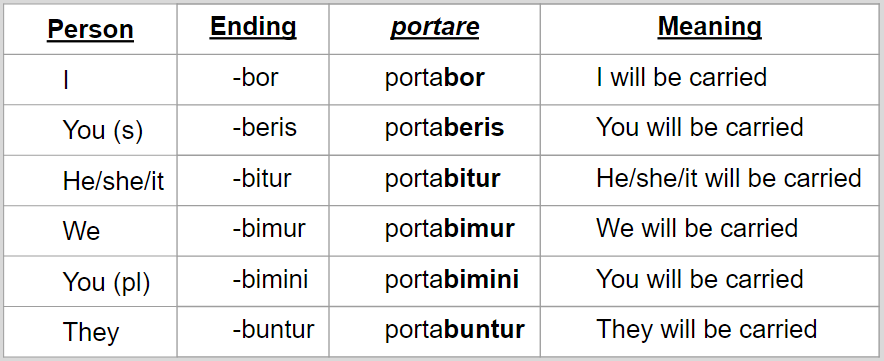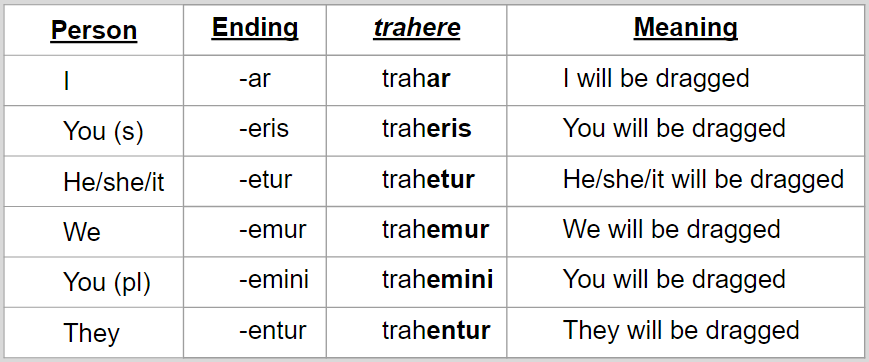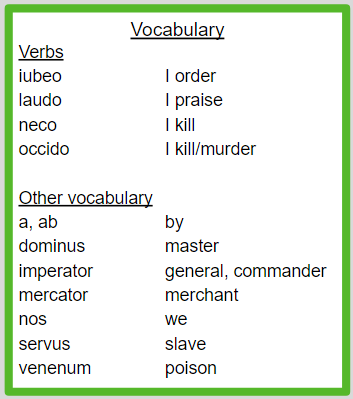Future Passives: You Will Be Taught!
January Latin Challenge: Day 28 of 31
The title is an example, not a threat! Future passive verbs are verbs that are in the passive voice and the future tense, and they do exactly what it says on the tin.
We’re in the final stretch of the January Latin Challenge now! Day 28 - well done for sticking with it (if anyone is left!). If you have missed any posts, or you have just found the Challenge and want to start it from the beginning, jump to the bambasbat archive to find all the previous posts!
If you're not sure about any verb endings, download my Complete Reference Guide to Latin Verbs. It has all the verb tables that you’ll need and it's fairly comprehensive, so go and grab it to have next to you as we go through this.
Active or Passive?
For an active verb, the nominative will be doing the verb. Exactly as we would expect:
The boy will kick the horse.
I've put it in the future as we're doing future verbs today.
A passive verb is when the nominative is having the verb done to it:
The boy will be kicked by the horse.
The boy is still the nominative in my sentence, but his role has changed. We now know that he is the one who will be passively kicked by the horse. He's not doing anything. It's happening to him.
What about in Latin?
Future passives are easy to spot in Latin:
They're formed from the present stem
They use the same passive endings as we've been going through with the present passives and the imperfect passives.
They have the future signifier in 1st & 2nd conjugation or a vowel change in 3rd & 4th conjugation
Remember: because they're future, I have to have a different table for first and second conjugation than I do for third and fourth conjugation. If you're not sure about why, I explain it all in my future active verbs post.
1st & 2nd conjugation
Take the present stem. Then add either -bo-, -be-, -bi- or -bu-. Then the usual passive endings go after that.
Note: anything with b except -ba-, because -ba- is imperfect.
In each case the person who's the nominative is having the verb done to them. They are going to be passive in the verb's action, but they are still grammatically nominative.
The simple present passive endings (-r, ris, -tur, etc.) are really useful verb endings to know, and you do need to know them. So keep them in mind, keep repeating them, keep chanting them. Keep getting really familiar with them.
Now, because they are future, we do have another set of endings to learn!
3rd & 4th conjugation
These use the present stem, then have a vowel change, and then add the passive ending. So the vowel changes from what you would expect in the present tense. This is how I get my rhyme!
First and second, future B. Third and fourth, always -e-
As many of my students pointed out, that rhyme doesn't really work because it's apart from being the first person of the third and fourth conjugation.
So I had to adapt it:
First and second, future B. Third and fourth, always -e-, [except in the first person]
Be really careful not to confuse these with present passives, as these endings can look very present. You just need to remember which verbs are your third and fourth conjugations. Principal parts come in very handy here - as the 2nd and 3rd principal parts help you figure out conjugations. Find my explanation of Principal Parts here.
Latin examples
There's a mix of first and second conjugation verbs, and third and fourth conjugation verbs, so be careful to check both of the tables above for endings. I've also got all the vocabulary below, so you just have to focus on the grammar.
Have a go at these, and read on when you’re ready for the explanations!
nos mercatores laudabimur.
imperatorem necare iubebor.
dominus ab servo veneno occidetur!
Read on when ready!
nos mercatores laudabimur.
laudabimur matches the 1st person plural ending for the first and second conjugation, “we will be praised”.
nos just indicates who I'm talking about. “we” or “us”
I also find out that we are mercatores, because that is plural nominative and therefore also matches laudabimur, the first person plural ending.
“We merchants will be praised.”
imperatorem necare iubebor.
iubebor matches the 1st person singular ending for the first and second conjugation, so “I will be ordered”.
Then I have an infinitive necare, “to kill”
imperatorem, “General” or “Commander”.
“I will be ordered to kill the general.” A very happy sentence.
dominus ab servo veneno occidetur!
And things keep getting happier! occidetur is my verb, and I could really easily confuse this with the present. However, I look down the tables of endings and I see that it is a third person singular of the future passive. It has an -e- not an -i- that I would expect from this 3rd conjugation verb. “He/she will be killed”.
Now I need to find a nominative. dominus: the master
ab servo is an ablative of agent - “by the slave”.
veneno, an ablative of instrument, “with poison”.
“The master will be killed by his slave with poison.”
How did you do? Were they all right? If you have any questions, let me know in the comments. Just make sure you double check all the verb endings, especially for the future tense.
Thank you so much for reading this post, I hope it's been useful, and I'll see you tomorrow for Day 29 of the January Latin Challenge on bambasbat!




